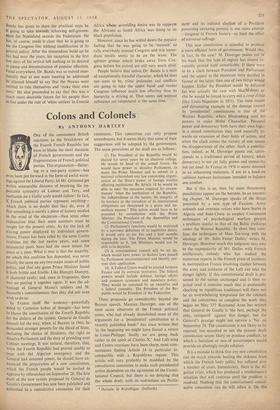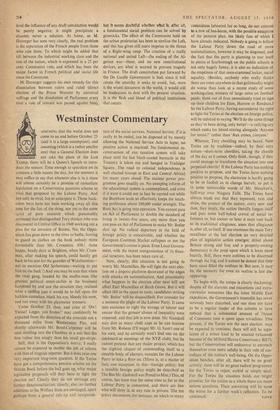Colons and Colonels
By ANTHONY HARTLEY
ONE of the commonest British reactions to the breakdown of the Fourth French Republic has been to blame the short duration of French governments and the fragmentation of French political parties. This explanation—flatter- ing to a two-party system—has even been put forward in the form of awful warn- ings against the Liberal Party; let Mr. Grimond get within measurable distance of breaking the im- peccable symmetry of Labour and Tory, and Confusion on a Gallic scale would follow! In fact, if French political parties represent anything— which there is no doubt that they do, even if that something is merely a piece of history ossified in the mind of the electorate—then some other explanation than their mere numbers must be sought for the present crisis. As for the lack of. staying power displayed by individual govern- ments, France has been ruled by the same Centre coalition for the last twelve years, and some ministerial posts have had the same tenant for years at a time. What is true is that the majority, on which this coalition has depended, was never exactly the same on any two major issues of public policy, and that any given Prime Minister found it both brittle and friable. Like Humpty-Dumpty, it shattered easily; and, once in fragments, there Was no putting it together again. It was the ad- vantage of General Massu's soldiers and M. Soustelle's committeemen that they did not even wish to do so.
In France itself the tendency—powerfully aided by Cartesian habits of thought—has been to blame the constitution of the Fourth Republic for the defects of the system. General de Gaulle himself led the way, when, at Bayeux in 1946, he demanded stronger powers for the Head of State, including the choice of Ministers, the right to dissolve Parliament and the duty of presiding over Cabinet meetings. It was natural, therefore, that, when the Fourth Republic had proved unable to cope with the Algerian emergency and the General had assumed power, he should have an nounced the -preparation of a new constitution, which the French people would be invited to approve by referendum on September 28. The first draft of the new system proposed by General de Gaulle's Government has now been published and submitted to a consultative committee for their comments. This committee can only propose amendments, but it seems likely that some of their suggestions will be adopted by the government. The main provisions of the draft are as follows: (1) The President of the Republic would be elected for seven years by an electoral college. He would be head of the armed forces. He would have power to dissolve Parliament, to name the Prime Minister and to submit to a national referendum any law concerning organi- sation of the State's power or foreign treaties affecting institutions. By Article 14 he would be able to take 'the measures required by circum- stances' when the institutions of the Republic, the independence of the nation, the integrity of its territory or the execution of its international obligations are threatened in a grave and im- mediate manner.' This action would have to be preceded by consultation with the Prime Minister, the Presidents of the Assemblies and the Constitutional Council.
(2) Parliament's functions would be restricted by a narrower definition of its legislative duties. It would only sit for five and a half months during the year. The Prime Minister would be responsible to it, but Ministers would not be able to be deputies.
(3) A constitutional council will be set up, which would have power to declare laws passed by Parliament unconstitutional and thereby pre- vent their application.
(4) A Federal Union would be created between France and its overseas territories. The federal powers would include defence, foreign affairs and common economic and monetary policy. They would be exercised by an executive and a federal assembly. The President of the Re- public would be President of the Federation.
These proposals go considerably beyond the Bayeux speech. Maurice Duverger, one of the most acute observers of the French political scene, who had already demolished most of the arguments for a 'presidential' constitution in a recently published book,* has since written that 'in the beginning we might have feared a return to Louis-Philippe; finally we are going back rather to the spirit of Charles X.' And Left-wing and Centre reactions have been sharp, most com- mentators finding Article 14 in particular in- compatible with a Republican regime. This article will very probably be modified by the consultative committee to make such presidential action dependent on the agreement of the Consti- tutional Council, but there is no denying that the whole draft, with its restrictions on Parlia- * Deinain, la Republique. (Juillard.) rent and its indirect election of a President possessing sweeping powers, is one more attempt —frequent in French history—to limit the effect of universal suffrage.
This new constitution is intended to produce a more efficient form of government. Would this, in fact, be the case? M. Duverger points out in his book that this type of regime has almost in- variably proved itself unworkable. If there were to be a clash between President and Parliament and the appeal to the electorate were decided in favour of the latter, then one of two things would happen. Either the President would be defeated (as was actually the case with MacMahon) or else he would be forced to carry out a coup cretin (like Louis-Napoleon in 1851). The most recent and devastating example of the damage caused by 'presidential' constitutions is that of the Weimar Republic, where Hindenburg used his powers to make Hitler Chancellor. Personal power and democracy both have their own logic; in a mixed constitution they tend naturally to- wards an extension of their fields of action, and when the clash comes the victory of one means the disappearance of the other. Such a constitu- tion, indeed, as M. Duverger points out, corre- sponds to a traditional period of history, when democracy is not yet fully grown and monarchy not yet dead. In France in 1958 it seems doomed to an exhausting stalemate, if not to a head-on collision between institutions intended to balance one another.
But if this is so, then far more threatening possibilities appear on the horizon. In an interest- ing chapter, M. Duverger speaks of the threat presented by a new type of Fascism. Army colonels and overseas colons who have learnt in Algeria and Indo-China to employ Communist techniques of psychological warfare present a problem similar to that of the Baltic freikorps under the Weimar Republic. 'In short they com- bine the techniques of Mao Tse-tung with the ideology of Mr. John Foster Dulles,' writes M. Duverger. However much this judgment may owe to the unpopularity of Mr. Dulles with French intellectuals, nobody who has studied the numerous reports in the French press of incidents in metropolitan France involving clashes between the army and militants of the Left can take the danger lightly. If this constitutional draft is pre- sented to the nation unchanged and is then re- jected (and it contains much that is profoundly shocking to republican traditions) will there not be an overwhelming temptation for the colonels and the committees to complete the work they began on May 13? Raymond Aron has written that General de Gaulle is 'the best, perhaps the only, safeguard' against this danger, but the General's prestige might not survive a 'No' on September 28. The constitution is not likely to be rejected, but accepted or not the present draft constitution seems likely to produce conflicts, to which a battalion or two of paratroopers would provide an alluringly simple solution.
It is a mistake to think that any new constitution can do much towards healing the sickness from which the French body politic has suffered over a number of years. Immediately, there is the Al- gerian crisis, which has produced a revolutionary situation that will continue until the problem is resolved. Nothing that the constitutional consul- tative committee can do will affect it. On this level the influence of any draft constitution would be purely negative; it might precipitate a disaster, never a solution. At home, as M. Duverger has seen very clearly, the real problem is the separation of the French people from those who rule them. To which might be added that rift between the industrial working class and the rest of the nation, which is expressed in a 25 per cent. Communist vote, and which has been the major factor in French political and social life since the Commune.
M. Duverger suggests his own remedy for this dissociation between rulers and ruled (direct election of the Prime Minister by universal suffrage and the dissolution of Parliament every time a vote of censure was passed against him), but it seems doubtful whether what Is, after all, a fundamental social problem can be solved by gimmicks. The effect of the Communist hold on the urban proletariat has been to sterilise the Left, and this has given still more impetus to the threat of a Right-wing coup. The creation of a really national and united Left—the ending of the Al- gerian war—these, and no new constitutional devices, are what is wanted to prevent tragedy in France. The draft constitution put forward by the De Gaulle Government is bad, since it will create the anarchy it seeks to avoid, but, were it the wisest document in the world, it would still be inadequate to deal with the present situation. It is the flesh and blood of political institutions that counts.































 Previous page
Previous page